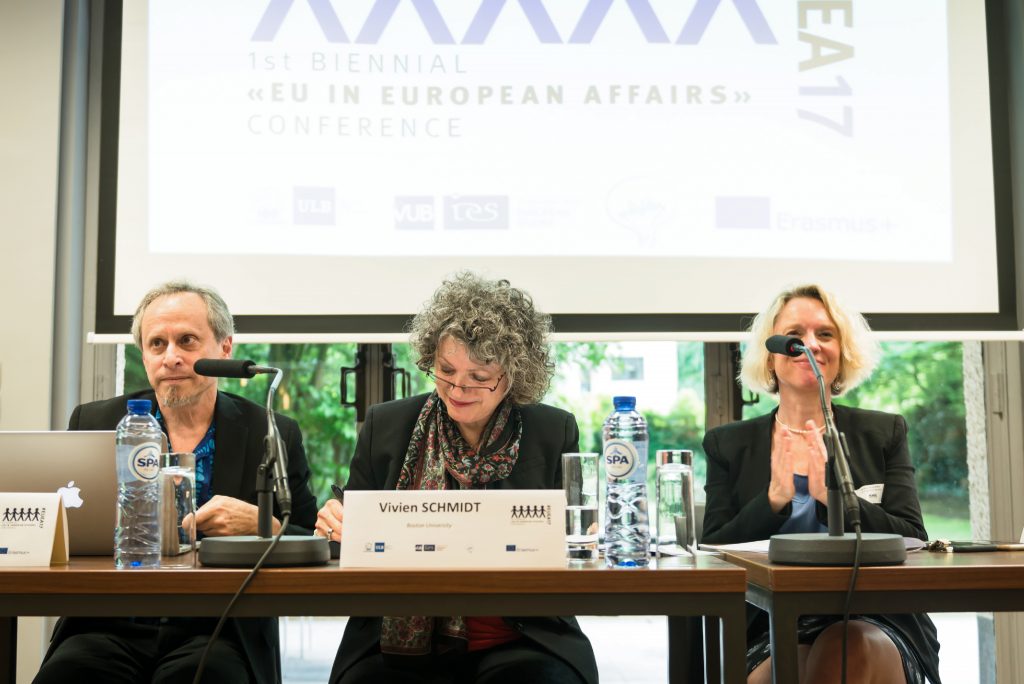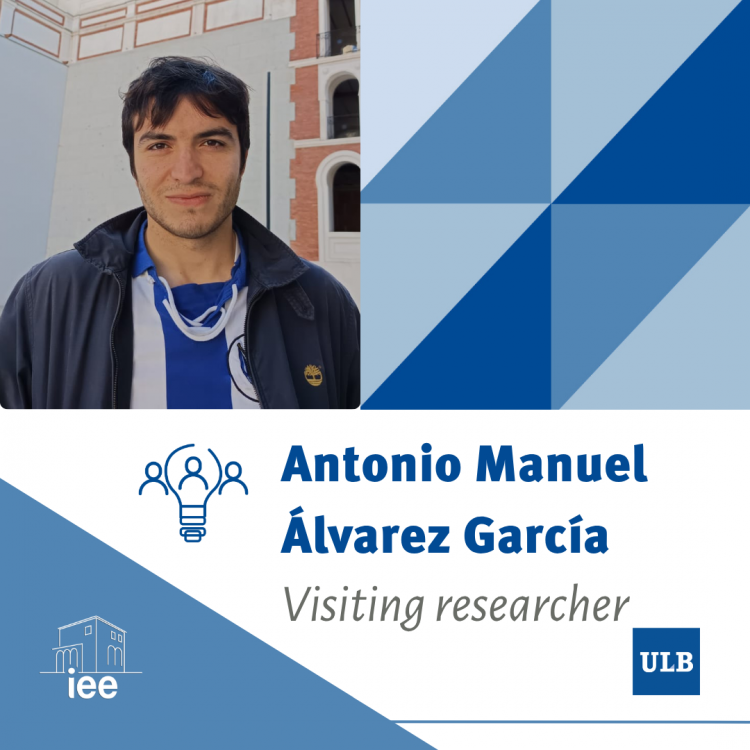Scholars of the European Union across different disciplines have highlighted a variety of fundamental norms to critically assess the standards underpinning the process of European integration – whether legal, economic or political in nature. The attention given to fundamental norms has however varied across time and disciplines. One thing is clear: the bibliography is scarce on one of the central values of European integration since its origins 60 years ago: solidarity. The First Biennial Conference “EU in European Affairs – EUEA” hopes to contribute to change that.
At a moment when the European Commission pushes legislation to advance the agenda of the 20 Key Principles of the European Pillar of Social Rights, and a few months before the European Solidarity Corps becomes a reality, the Institut d’études européennes at ULB, in coordination with its homologue Institute for European Studies at the VUB, organized, from May 22nd to 23rd the First Biennial Conference “EU in European Affairs – EUEA.”
The two-day event “Controversial Approaches towards European Solidarity – From Burden Sharing to Integration,” represented an opportunity for an academic and policy oriented discussion on migration, asylum, security, jobs, education, health, inclusion, as well as on financial sustainability, tax regulation and economic governance, all through the lens of solidarity.
A “social” discussion
For professor Herman Mark Schwartz, from the University of Virginia, babies are at the core of our pension system. In his presentation “Babies, bonds and buildings,” part of the panel “Responses to de Debt Crisis and Struggles over European Solidarity,” he explains why.
Social disinvestment, says professor Ides Nicaise, from the KU Leuven, has deeply hurt vulnerable groups. In his research he’s found that social dumping and fiscal dumping in the EU has meant less resources for the social sectors with a serious impact on people’s lives.
The concept of solidarity itself as a European value, defined by EC president Jean-Claude Juncker as “the glue that keeps our Union together,” went under scientific scrutiny during the conference. Policy makers and representatives of topic-related NGOs also had their word.
For Julien Dijol, Deputy Secretary-General of Housing Europe, solidarity should be a European value. “If the EU wants to develop a social market economy,” says Dijol, affordable housing is a key dimension to take into consideration.
Specific research topics dealt with by ENLIGHTEN (Banking Crises and Fiscal Sustainability, Deficit Reduction and Continuity of Public Services, Youth Employment and Inclusive Growth) provide a pertinent ground to debate around solidarity –and European approaches to it- in those contexts.
For professor Amandine Crespy, from the Université libre de Bruxelles and the Institut d’études européennes (IEE-ULB), there is a paradox created by member states’ acceptance of more constraining rules by the EU and, at the same time, their rejection of supranational intervention on social policy. She explains:
How can deficit reduction occur without deteriorating the very elements that constitute the social pillar of the EU? On healthcare and health services, Cristina Chiotan, policy and advocacy leader at Eurohealthnet, disparities need to be better addressed because they lead to inequalities.
Legitimacy and governance in times of crisis
The most pressing questions around solidarity were addressed by our speakers. Among others, is solidarity a solution or a challenge to the current tensions in EU politics? What forms of solidarity have passed the test of recent European crises? How does it manifest in the Union’s internal and external policies?
The association of the Jean Monnet Center at the Institut d’études européennes with the Horizon 2020 ENLIGHTEN collaborative project for the conference “Controversial Approaches towards European Solidarity –from Burden Sharing to Integration”- adds another dimension to the reflection and the discussions: the legitimacy of European governance in dealing with what Enlighten researchers have named fast and slow-burning crises.
In its search for solutions, the EU developed mechanisms for governance in both the slow and fast-burning phases of its crises. The European Semester, one of the case studies of the Enlighten project, is a result of those efforts to enhance EU legitimacy. Professor Ramona Coman, from the IEE-ULB sheds light on the discussion.
Following the money trail
From the fiscal point of view, less hypocrisy and a more hands-on approach is needed, says John Christensen, Director of Tax Justice Network. To him, the way some countries compete on tax undermines the national sovereignty of other nation states.
Debt has been at the center of the EU’s recent troubles. For professor Daniel Mügge, from Universiteit van Amsterdam, people have yet to understand that debt is not an individual problem, but a drag on society as a whole. “It affects everybody”, says professor Mugge, “because it inhibits the kind of economic dynamism that we need.”
Solutions being currently discussed were also debated at #EUEA17. A European Universal Basic Income, for instance, could be a very straightforward way for the EU to put solidarity in practice.
ULB/University of Warwick’s Phd Researcher François Denuit, says it would be the materialization of social citizenship.
Untangling the confusion: refugees, asylum and criminal law
The refugee crisis, and the response by EU member states and at the supranational level has also been at the center of the debate in the last years. This crisis has unfolded in the challenging context of terrorism, and the counter-terrorist approach to police and justice cooperation, all while populist movements in Europe spread confusion in public opinion by mixing religion, terrorism, migrants and asymum seekers.
To Post-Doctoral Researcher Seda Gürkan the refugee crisis and the responses the EU and other nations have given to it show that solidarity is a value under tremendous stress. She explains to what extent:
Professor Philippe De Bruycker agrees on the pressures and disparities of approach to a crisis he belives is more due to the lack of preparation of the EU to deal with it that to the number of asylum seekers.
“We do not have the political climate to build a common asylum policy,” says De Bruycker. For him, “the crisis showed us we don’t share the same values and goals regarding refugees.”
A balance between the “sword and the shield” functions of the legal system is indispensable, according to IEE-ULB professor Anne Weyembergh. It is not quite the case, she says, for the power dynamics between the police and justice.
And in the midst of this situation, cultural differences, religion, anything that exemplifies “the other” can be used to further sow distrust, and oppose solidarity.
“Religion is everywhere to be seen and has great symbolic value in times of crisis,” says IEE-ULB professor François Foret. “But cultural differences don’t mean clash of civilisations.”
Ironies can result from the efforts to undermine solidarity, as ULB’s Post Doctoral Researcher Oriane Calligaro has found. For example, Greece has been at the center of the Eurozone crisis, but it is also at the core of unifying references when it comes to heritage.
The post-Brexit future
A look at the EU in its relations with member states, and the future after Brexit was also addressed by our #EUEA17 experts. After Brexit, says Christof Roos, from the VUB, the EU will get back to its roots, “and we will see further integration and a stronger alliance between France and Germany.”
The United Kigdom has been a key voice in defence, security and military policy in the EU. After Brexit, says Cambridge professor Julie Smith, the future of the European foreign policy will be stronger if the relationship with the UK is robust looking forward.
Interdisciplinary participation
The conference is co-financed by the Jean Monnet Project at the Institut d’études européennes and H2020 project ‘European Legitimacy in Governing through Hard Times: the role of European Networks’ (ENLIGHTEN) and it includes representatives from the following EC financed projects:
- H2020 RIA COFFERS Project (Combating Fiscal Fraud and Empowering Regulators) – www.coffers.eu
- H2020 ERC CORPLINK Advanced Grant (Corporate Arbitrage and CPL Maps: Hidden Structures of Controls in the Global Economy) –
- H2020 RIA ENLIGHTEN Project (European Legitimacy in Governing through Hard Times: the role of European Networks) – www.enlightenproject.eu
- H2020 MSCA GEM-STONES European Joint Doctorate (Globalisation, Europe & Multilateralism – Sophistication of the Transnational Order, Networks, and European Strategies) – www.gem-stones.eu
- H2020 RIA RE-InVEST Project (Rebuilding an inclusive, value based Europe of solidarity and trust through social investments) – www.re-invest.eu


 “The European Commission support for the production of this publication does not constitute an endorsement of the contents which reflects the views only of the authors, and the Commission cannot be held responsible for any use which may be made of the information contained therein.”
“The European Commission support for the production of this publication does not constitute an endorsement of the contents which reflects the views only of the authors, and the Commission cannot be held responsible for any use which may be made of the information contained therein.”

